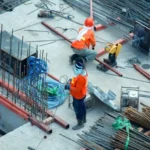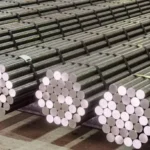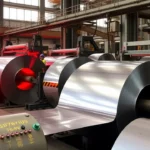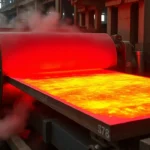More Posts...
-

Steel Round Bars: The Backbone of the Construction Industry in India and Beyond
-

EN Round Bar – A Comprehensive Guide for Engineers & Industries
-

Understanding Mild Steel and IS 2062: A Comprehensive Guide
-

Heat Treatment of Heavy Steel Plates: Why It Matters and How It Works
-

Sustainable Practices in Wire Rod Production: A Path Towards a Greener Future
-

India Emerges as the Only Top 5 Steel Producer to See Growth Amidst Global Challenges
Get Your Custom Quote
Mild steel is one of the most commonly used materials in industrial and structural applications across the world. It is valued for its strength, workability, affordability, and versatility. In India, mild steel used for structural purposes is governed by a national standard known as IS 2062. This standard ensures uniformity in quality, properties, and suitability of steel across a wide range of industries.
This blog explores the characteristics of mild steel, the significance of IS 2062, the different grades and qualities available under this standard, and why understanding this standard is essential for engineers, fabricators, and buyers.
What is Mild Steel?
Mild steel, also referred to as low carbon steel, is a category of carbon steel that contains a relatively low amount of carbon — typically between 0.15% and 0.25%. It may also contain small amounts of manganese, silicon, and trace elements. Due to the low carbon content, mild steel is not as hard as high carbon steel but is more ductile, weldable, and machinable.
Key Properties of Mild Steel
Good ductility and formability: Can be easily bent, cut, and welded
Moderate tensile strength: Suitable for most structural applications
Economical: One of the least expensive types of steel
Non-hardenable by heat treatment: Can only be strengthened through cold working
Requires corrosion protection: Prone to rusting, hence needs to be painted or galvanized
Introduction to IS 2062
IS 2062 is a product standard published by the Bureau of Indian Standards (BIS) for hot-rolled low, medium, and high tensile structural steel. This standard specifies the requirements for chemical composition, mechanical properties, testing methods, and dimensional tolerances of steel used in structural and general engineering applications.
IS 2062 is applicable to plates, sections, flats, bars, and other structural steel products. The standard is crucial for ensuring the quality and consistency of steel used in load-bearing and safety-critical applications.
Grades of IS 2062
IS 2062 includes several grades of structural steel, which are primarily classified based on their minimum yield strength. Yield strength is the stress at which steel begins to deform plastically. Higher grades provide better strength but may be less ductile.
The most common grades under IS 2062 are:
IS 2062 E250: Minimum yield strength of 250 MPa (megapascals)
IS 2062 E275: Minimum yield strength of 275 MPa
IS 2062 E300: Minimum yield strength of 300 MPa
IS 2062 E350: Minimum yield strength of 350 MPa
IS 2062 E410 and E450: Higher strength grades for demanding applications
These grades are often followed by a Quality Designation: A, B, or C.
Quality Designations
E250A, E250B, E250C: Indicates the level of testing and additional requirements
A refers to basic quality
B includes impact tests at 0°C
C includes more stringent tests and better weldability (fully killed steel)
Chemical Composition
Each grade has defined limits for elements such as:
Carbon (C)
Manganese (Mn)
Sulphur (S)
Phosphorus (P)
Silicon (Si)
For example, IS 2062 E250 typically has a maximum carbon content of 0.23%, which provides a balance of strength and ductility.
Applications of IS 2062 Mild Steel
Due to its reliable mechanical properties and good weldability, IS 2062 mild steel is widely used across multiple industries. Typical applications include:
Construction and infrastructure: Beams, channels, angles, columns, frames, and supports
Automotive and transportation: Chassis, brackets, and components
Machinery and equipment: Structural frames, base plates, and enclosures
Shipbuilding: Hulls, decks, and support structures
Oil and gas industry: Pipelines, tanks, and supports
Railways: Coach fabrication, wagons, and structural members
IS 2062-compliant steel is also used in fabrication projects where weldability and ease of forming are critical.
Testing and Certification
Steel supplied under IS 2062 is subject to several mechanical and chemical tests to ensure quality. These include:
Tensile strength test: Ensures the steel can withstand required loads
Yield strength test: Determines the stress at which the material deforms
Elongation test: Assesses ductility and stretching capacity
Charpy impact test: Required for quality B and C; checks performance at low temperatures
Chemical analysis: Verifies compliance with prescribed chemical composition
Certified materials are accompanied by a Mill Test Certificate (MTC) detailing the test results and confirming conformity with the IS 2062 standard.
Why IS 2062 Matters ?
IS 2062 is not just a technical code — it is the foundation upon which the quality and integrity of structural steel in India are built. In a country where infrastructure is developing at a rapid pace and the demand for reliable construction materials is higher than ever, the importance of using standardized steel cannot be overstated. This standard plays a pivotal role in maintaining consistency, safety, and performance in a wide range of engineering and industrial applications.
The essence of IS 2062 lies in its ability to bring uniformity to the steel market. It defines precise chemical compositions and mechanical properties that manufacturers must adhere to when producing structural steel. This ensures that regardless of where the steel is sourced from, it will meet the minimum standards required for strength, ductility, and durability. Engineers and designers rely on these predefined properties to make accurate calculations during the design phase, knowing that the steel they use will perform reliably under stress.
Beyond quality assurance, IS 2062 facilitates better communication and understanding between manufacturers, fabricators, contractors, and end-users. When a buyer specifies IS 2062 E250 or E350 grade steel, there is no ambiguity about what is being requested. Everyone in the supply chain knows exactly what the material should offer in terms of strength, weldability, and impact resistance. This streamlines procurement and reduces the chances of errors or disputes in the sourcing process.
Why Choose Global Steels Industries for IS 2062 Mild Steel?
At Global Steels Industries, we supply high-quality IS 2062-certified steel plates, suitable for a wide range of industrial and engineering applications. Our plates are sourced from trusted mills and meet all specifications laid out by the Bureau of Indian Standards under IS 2062.
We focus on providing only hot-rolled steel plates in various grades like E250, E350, and higher, ensuring consistency in mechanical performance, dimensional accuracy, and structural reliability. Each plate is accompanied by a Mill Test Certificate (MTC) to guarantee compliance with IS 2062 standards.
Our commitment to quality, prompt delivery, and transparent service has earned us the trust of clients across India and overseas. When you source IS 2062 steel plates from Global Steels Industries, you’re investing in certified strength, dependable supply, and professional support every step of the way.
Conclusion
Mild steel remains a cornerstone material in industrial and structural applications due to its cost-effectiveness and performance. The IS 2062 standard provides a reliable framework for ensuring quality, safety, and suitability of mild steel in various projects. Whether you’re building infrastructure, fabricating machinery, or designing structural components, choosing IS 2062-compliant mild steel from a reputable supplier like Global ensures that your project meets industry standards and performs reliably.
For inquiries, quotations, or technical consultation, contact us at:
Email: abde@globalsales.co.in
Website: www.globalsales.co.in



